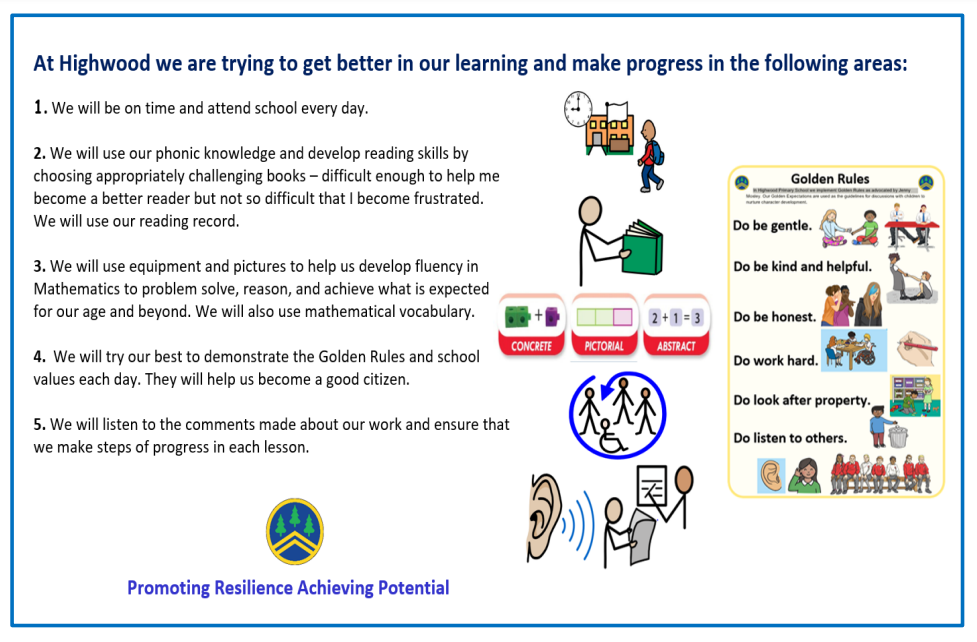The School Improvement Plan sets out our strategic priorities for improving the school
| Key Priority | Areas for Improvement |
|
Quality of Education |
To ensure the school’s curriculum intent and implementation are embedded securely and consistently across the school and impact is evident by what pupils have learned.
QE 1. All staff understand that the curriculum is sequenced logically and progressively, so that teaching is built on previous learning. QE 2. Each Subject Leader can speak the narrative for the curriculum and can explain why the Highwood Curriculum ensures knowledge and skills build into long-term memory. QE 3. First Quality Teaching is applied in each class, ensuring strategies to support pupils in the lowest 20% are inclusive, and interventions, personalised and adaptive teaching support pupils to make progress in their learning. QE 4. For all staff within Juniper, inclusion provision, ensure planned learning opportunities are meaningful, purposeful and it aids progression. QE 5. Staff CPD is relevant to build confidence in delivering the curriculum, assessment, and quality first teaching. |
| Leadership and Management | LM 1. To strengthen the effectiveness of Senior (SLT) and Subject (ELT) leadership and management so that they can carry out their roles effectively and impact teaching, learning, achievement, and attainment across the school.
LM 2. To continue to develop distributed leadership across the school and make effective use of all staff expertise and talents. LM 3. To establish a new partnership of peer review and collaboration. Further, develop our existing and emerging leaders through our strategic partnerships within Hertfordshire. LM 4. Embed Governance, establishing a highly effective body with specific responsibilities carried out to provide strategic challenge and support. |
| Personal Development | PD 1. To integrate the school values of respect, empathy, gratitude, honesty and resilience throughout the curriculum and beyond the academic ensuring pupils develop as broad-minded British citizens.
PD 2. To promote Spiritual, Moral, Social, and Cultural (SMSC), mental health, and well-being, PSHE including Relationships Education among the whole school community, addressing the unprecedented times regarding post COVID- 19. The recovery curriculum has a positive pastoral impact. |
| Behaviour and Attitudes | BA 1. To embed the Behaviour Policy and statement of principles focusing upon Restorative Justice as integral to the behaviour personal development, and welfare process of resolving conflict.
BA 2. To strengthen the monitoring systems and processes for managing attendance, absence, and punctuality. |
| Early Years | To ensure that the EYFS curriculum is sequenced logically and provides no limits or barriers to the children’s achievements, regardless of their backgrounds, circumstances or needs; that high ambition and understanding is shared by all staff.
EY 1. To provide a highly stimulating environment with an organisation of the curriculum that provides rich, varied and imaginative experiences. As a result, this develops independent and outside learning opportunities through effective facilitation. EY 2. To embed the new framework reforms for EYFS 2020. Maintain the proportion of children achieving Good Level above the national average ( above 78%) EY 3. To improve Early Reading and attainment by improving the quality of phonics teaching EY 4. Continue to improve on contributions of children and parents into the learning journals as evidence of progress in prime and specific areas of learning |
Child Friendly Version:

